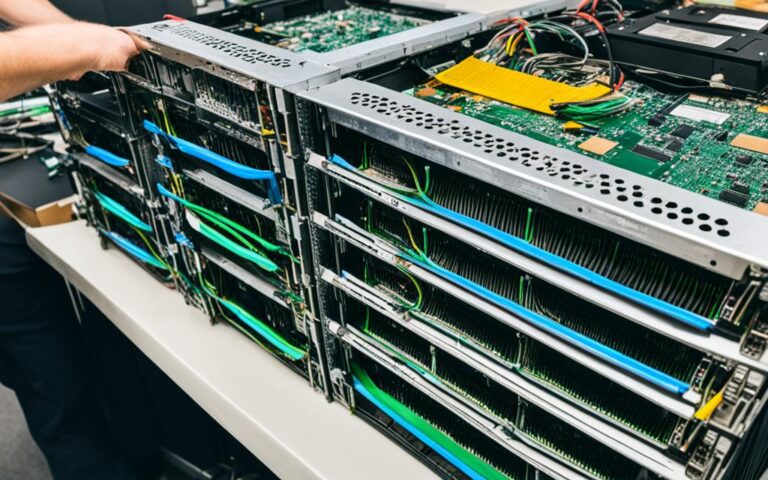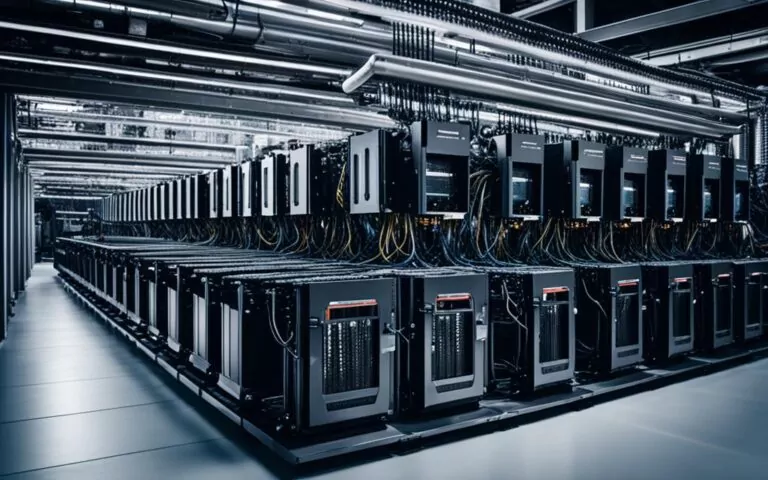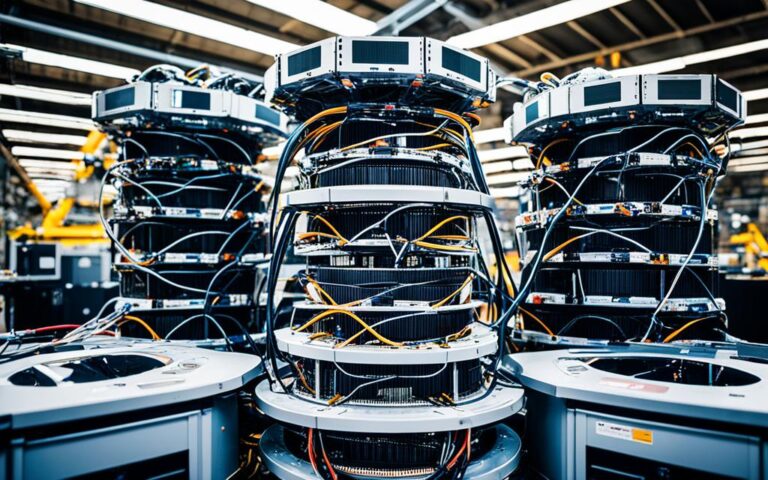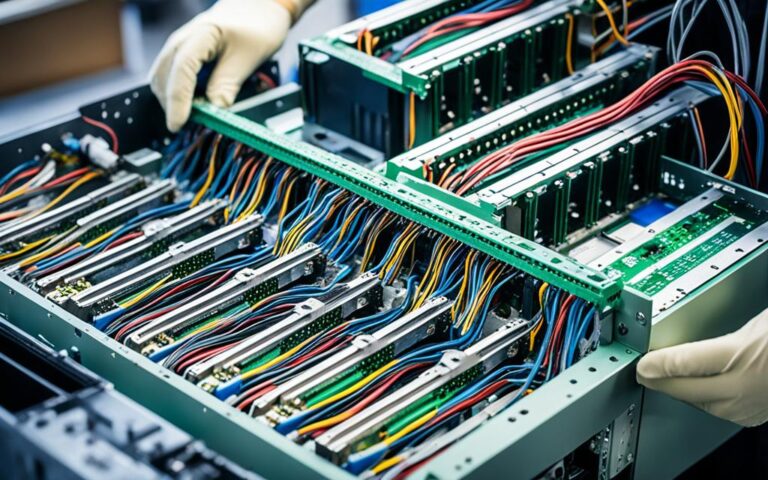Server Recycling: Best Practices for Data Centers
Data centre server recycling is not just about responsible disposal; it’s about making a positive impact on the environment while safeguarding data security. As the demand for data centres continues to grow, so does the need for environmentally friendly solutions. This article delves into the world of data centre decommissioning, exploring the best practices for responsible disposal, recycling, and the adoption of sustainable strategies.
When it comes to data centre server recycling, responsible disposal is key. Adopting environmentally friendly solutions ensures that decommissioned servers are not only disposed of responsibly but also contribute to the reduction of electronic waste. By repurposing and recycling equipment, waste can be minimized, and valuable resources can be reclaimed.
One of the first steps towards responsible disposal is conducting an environmental assessment to identify potential hazards. This assessment helps in developing sustainable strategies that prioritize the safety of both the environment and personnel. It is essential to partner with certified e-waste recyclers who can handle the disposal safely and responsibly, reducing the environmental impact.
When disposing of data centre equipment, it is crucial to prioritize recycling and reuse. Rather than sending everything to landfill, consider repurposing functional equipment or donating it to extend its lifecycle. Working with certified e-waste recyclers ensures proper handling and disposal of electronic components, reducing the environmental footprint.
Data security is paramount in the decommissioning process. Choose certified data destruction methods to ensure sensitive information is securely wiped from servers. This includes physical destruction of hard drives or secure data wiping techniques. Partnering with reputable data destruction services provides peace of mind that data is disposed of responsibly and according to legal and industry regulations.
Efficient disposal of data centre equipment also involves the proper handling of hazardous materials. Many components contain hazardous substances that must be managed and disposed of safely. Partnering with specialized waste management companies ensures compliance with strict environmental regulations and minimizes the impact on ecosystems and human health.
Energy consumption is a significant concern in data centres. When decommissioning, consider salvaging and reusing equipment that can contribute to energy generation. Additionally, investing in renewable energy sources like solar or wind power can offset energy consumption and promote a more sustainable approach to managing data centres.
Throughout the decommissioning process, accurate documentation is essential. It allows for the tracking of progress, identification of areas for improvement, and demonstrates a commitment to sustainable practices. Record details such as waste volume, recycling and disposal methods used, and carbon emissions offset through renewable energy.
Data centre server recycling is not just about disposal and sustainability – it’s about making a difference. By embracing responsible practices, recycling and reusing equipment, securing data destruction, and implementing sustainable strategies, organisations can significantly reduce the environmental impact of data centre decommissioning while contributing to a greener future.
Conducting an Environmental Assessment
Before decommissioning a data centre, it is essential to conduct a thorough environmental assessment. This assessment helps identify the potential hazards and risks to the environment that may arise during the decommissioning and disposal stages.
By understanding the environmental impact of the decommissioning process, organizations can develop sustainable strategies to ensure responsible disposal of data centre components. This not only minimizes the potential environmental harm but also contributes to long-term sustainability goals.
During the environmental assessment, potential hazards such as hazardous materials, energy consumption, and carbon emissions are evaluated. The findings from this assessment provide valuable insights into the necessary measures that need to be taken to mitigate these risks and ensure proper disposal.
By taking the time to assess the environmental impact, data centre operators can make informed decisions about the most sustainable strategies to adopt. This may involve implementing energy-efficient technologies, reducing waste generation, and implementing recycling programs to minimize electronic waste.
“The assessment stage is a critical step in the path towards environmentally responsible data centre decommissioning. It allows us to identify potential hazards and develop sustainable strategies to mitigate them.” – Emma Thompson, Environmental Consultant
By conducting an environmental assessment, data centre operators can proactively address potential hazards, adopt sustainable strategies, and contribute to a greener and more sustainable future.
Prioritizing Recycling and Reuse
When it comes to decommissioning a data center, it’s essential to prioritize recycling and reuse instead of disposing of components entirely. By working with certified e-waste recyclers, you can ensure the proper handling and disposal of electronic components, effectively reducing the environmental footprint. Additionally, repurposing functional equipment or donating it can extend its lifecycle and significantly contribute to reducing electronic waste.
Partnering with reputable e-waste recyclers is crucial in ensuring responsible disposal. These professionals have the expertise to handle electronic components safely, preventing them from ending up in landfills where they can harm the environment. By choosing to recycle, you actively participate in the circular economy and contribute to a more sustainable future.
“The best way to predict the future is to create it.”
– Peter Drucker
Repurposing Equipment for a Sustainable Future
One of the key ways to reduce electronic waste is through repurposing equipment whenever possible. Instead of discarding functional components, consider whether they can be used in other areas of your organization or even donated to charitable causes. Repurposing not only extends the lifespan of the equipment but also minimizes the need for new manufacturing, resulting in reduced energy consumption and carbon emissions.
For instance, a server that may no longer be suitable for data center operations could be repurposed for less resource-intensive tasks, such as a local file server or a testing environment. With a little creativity and forward thinking, repurposing equipment can unlock new possibilities and help build a more sustainable future.
Another benefit of repurposing equipment is the cost savings it offers. By utilizing existing resources, you can reduce the need for purchasing new equipment, leading to significant financial savings. This can be particularly advantageous for businesses looking to optimize their IT budgets while also prioritizing sustainability.
Reducing the Environmental Impact
Reducing electronic waste is not only an environmental responsibility but also an opportunity to showcase your organization’s commitment to sustainability. By actively participating in recycling and repurposing efforts, you contribute to the conservation of valuable resources and help prevent the harmful effects of improper e-waste disposal.
Moreover, recycling and repurposing can positively impact your brand image and reputation, as customers and stakeholders increasingly prioritize organizations that prioritize sustainability. By clearly demonstrating your commitment to reducing electronic waste, you position your business as a responsible and environmentally conscious leader in your industry.
Summary
Prioritizing recycling and reuse in data center decommissioning is not only environmentally beneficial but also economically advantageous. By partnering with certified e-waste recyclers, repurposing equipment, and reducing electronic waste, organizations can contribute to a more sustainable future while showcasing their commitment to responsible IT practices.
Securing Data Destruction
When it comes to decommissioning a data center, data security should be at the forefront. Ensuring the responsible disposal of sensitive information is crucial for protecting your organization and its stakeholders. Implementing certified data destruction methods guarantees that data is securely and irreversibly erased, leaving no room for potential breaches or unauthorized access to confidential data.
There are two primary certified data destruction methods widely used in the industry:
- Physical Destruction of Hard Drives: This method involves physically destroying hard drives, rendering the data stored on them permanently inaccessible. By physically shredding or crushing the drives, organizations can eliminate any possibility of data recovery.
- Secure Data Wiping Techniques: Secure data wiping techniques involve overwriting the data on the drives multiple times with complex algorithms, making it virtually impossible to retrieve any sensitive information. This method ensures the complete removal of data while leaving the drives intact and ready for recycling or reuse.
Partnering with reputable data destruction services is essential to ensure compliance with legal and industry regulations. These services specialize in implementing certified data destruction methods, guaranteeing the responsible disposal of data center equipment. By working with experienced professionals, organizations can safeguard sensitive data and maintain the integrity of their data security protocols.
Reputable Data Destruction Services
When selecting a data destruction service provider, organizations should look for certification and accreditation from recognized industry bodies. These certifications validate the service provider’s commitment to following best practices, ensuring the secure disposal of data and compliance with data protection laws and regulations.
“Responsible disposal is not just about physically getting rid of old equipment. It’s about safeguarding data and ensuring compliance with regulations. Partnering with certified data destruction services gives organizations peace of mind, knowing that sensitive information is securely disposed of.”
By opting for certified data destruction methods and partnering with reputable data destruction service providers, organizations can confidently comply with data protection regulations, safeguard sensitive information, and achieve responsible disposal of their data center equipment.
| Benefits of Opting for Certified Data Destruction Methods | Advantages of Partnering with Reputable Data Destruction Services |
|---|---|
| 1. Ensures compliance with legal and industry regulations | 1. Certification and accreditation validate adherence to best practices |
| 2. Eliminates the risk of unauthorized access to sensitive data | 2. Expertise in implementing certified data destruction methods |
| 3. Protects the organization’s reputation and stakeholders’ trust | 3. Secure disposal of data center equipment |
| 4. Minimizes the potential for data breaches | 4. Peace of mind in ensuring data security |
| 5. Demonstrates commitment to responsible disposal | 5. Compliance with data protection laws and regulations |
By prioritizing data security through certified data destruction methods and partnering with reputable data destruction services, organizations can proactively protect sensitive information, maintain compliance, and uphold responsible disposal practices.
Efficient Equipment Disposal
Proper disposal of data center equipment is crucial for minimizing environmental impact. Many components contain hazardous materials that must be handled appropriately. Partnering with specialized waste management companies ensures the safe disposal of hazardous materials in compliance with strict environmental regulations.
When decommissioning a data center, it is essential to prioritize the proper disposal of equipment, considering the presence of hazardous materials. These materials, such as lead, mercury, and cadmium, can pose significant risks to the environment and human health if not managed correctly. Partnering with specialized waste management companies ensures expertise in handling, transporting, and disposing of hazardous materials, guaranteeing compliance with environmental regulations.
Specialized waste management companies have the necessary knowledge and skills to identify different types of hazardous materials present in data center equipment. They utilize environmentally responsible and legally compliant methods for the safe disposal or recycling of these materials. Proper disposal ensures that hazardous substances do not leach into the soil, contaminate water sources, or pollute the air, protecting both the environment and local communities.
By partnering with specialized waste management companies, data center operators can ensure the efficient and responsible disposal of equipment and hazardous materials. These companies have the expertise to handle hazardous substances and comply with environmental regulations, mitigating the potential risks associated with improper disposal methods.
“Partnering with specialized waste management companies ensures the proper disposal of hazardous materials in compliance with environmental regulations.”
To illustrate the importance of partnering with specialized waste management companies, consider the following example:
| Item | Hazardous Material | Disposal Method |
|---|---|---|
| Computer Servers | Mercury in switches and relays | Safe extraction and controlled disposal of mercury |
| Batteries | Lead-acid | Proper recycling to prevent lead pollution |
| Circuit Boards | Lead solder and brominated flame retardants | Specialized recycling to recover valuable materials and prevent environmental contamination |
In this example, the partnership with a waste management company ensures the safe extraction and disposal of mercury from computer servers, proper recycling of lead-acid batteries to prevent lead pollution, and specialized recycling of circuit boards to recover valuable materials while minimizing environmental contamination.
By entrusting the disposal of hazardous materials to specialized waste management companies, data center operators can safeguard the environment and comply with stringent environmental regulations. The expertise and experience of these companies ensure that the disposal process is carried out responsibly, minimizing the ecological impact and promoting sustainable waste management practices.
“Partnering with specialized waste management companies ensures efficient and responsible disposal of hazardous materials, minimizing the environmental impact.”
Energy Recovery and Renewable Solutions
Data centers consume significant amounts of energy, contributing to the growing concern of energy consumption and its environmental impact. When decommissioning a data center, it is essential to explore energy recovery options and consider salvaging equipment that can contribute to energy generation. By adopting renewable energy sources like solar or wind power, data center operators can not only offset their energy consumption but also actively promote a more sustainable approach.
One effective way to reduce energy consumption is by salvaging and reusing equipment which may still have potential value. When certain components can no longer be used in the data center, they can be repurposed for other energy-intensive industries. For example, servers and cooling systems can be repurposed for scientific research facilities or educational institutions. This salvage and reuse strategy not only extends the lifespan of equipment but also minimizes electronic waste, making it a win-win solution for both the environment and businesses.
“The transition to renewable energy sources has become essential in today’s world. Data centers play a significant role in driving energy consumption, but they also have the potential to become power generators. By investing in renewable energy solutions, data centers can make a positive impact on the environment while ensuring sustainable growth.” – Jane Thompson, Environmental Sustainability Expert
Investing in renewable energy sources has numerous benefits for data centers. By harnessing solar or wind power, data centers can offset their energy consumption from traditional energy sources, reducing carbon emissions and minimizing their environmental impact. Renewable energy solutions provide a long-term, sustainable approach to meeting energy needs without compromising the quality or reliability of data center operations.
Renewable Energy Adoption in Data Centers
The adoption of renewable energy in data centers is a growing trend. Many data center operators are recognizing the environmental and economic benefits of transitioning to renewable energy sources. For example, Google’s data centers extensively utilize solar and wind power, demonstrating their commitment to sustainable practices. By investing in on-site renewable energy generation and partnering with local renewable energy providers, businesses are actively reducing their carbon footprint and contributing to a more sustainable future.
| Data Center Operator | Renewable Energy Adoption |
|---|---|
| Extensive utilization of solar and wind power in data center operations. | |
| Apple | 100% renewable energy-powered data centers across the globe. |
| Microsoft | Investment in renewable energy projects and commitment to carbon neutrality. |
By embracing energy recovery options and investing in renewable energy sources, data center operators can significantly reduce their energy consumption and carbon footprint. Not only does this contribute to a greener and more sustainable future, but it also showcases businesses’ commitment to responsible environmental practices.
Documentation and Reporting
Maintaining accurate documentation throughout the decommissioning process is essential for compliance and accountability. By recording details such as waste volume, recycling and disposal methods used, and carbon emissions offset through renewable energy, organizations can track progress and demonstrate their commitment to sustainable practices.
Tracking Progress for Sustainable Practices
The documentation and reporting of data center decommissioning activities allow organizations to track their progress towards sustainable practices. It enables them to monitor the effectiveness of their recycling and disposal methods, identify areas for improvement, and make informed decisions regarding future decommissioning projects.
Accurate documentation serves as a valuable source of information, helping organizations measure their environmental impact and evaluate the success of their sustainability initiatives. It provides a comprehensive record of the data center decommissioning process, including the steps taken to responsibly dispose of equipment and the measures implemented to mitigate environmental harm.
The Importance of Accountability
Accountability is crucial when it comes to data center decommissioning. By maintaining accurate documentation, organizations uphold their responsibility to stakeholders, regulatory bodies, and the wider community. It demonstrates transparency and ensures that appropriate measures are taken to protect the environment and safeguard sensitive data during the decommissioning process.
Accurate documentation not only helps organizations stay compliant with regulatory requirements but also instils trust among stakeholders. It shows that responsible disposal and sustainable practices are top priorities.
Benefits of Accurate Documentation
In addition to compliance and accountability, accurate documentation offers several benefits:
- Facilitates continuous improvement: By analyzing the documented data, organizations can identify patterns, trends, and areas for optimization. This empowers them to implement more efficient and sustainable practices in future decommissioning projects.
- Enables benchmarking and industry comparisons: Documentation allows organizations to compare their practices and performance against industry standards and best practices, fostering a culture of continual improvement.
- Serves as a reference for future projects: The documented information can be used as a reference for future data center decommissioning projects. It provides valuable insights into successful strategies and lessons learned, streamlining future processes.
With accurate documentation, organizations can track progress, make data-driven decisions, and continuously improve their sustainable practices in data center decommissioning.
Conclusion
Data center decommissioning presents a unique opportunity for organizations to embrace sustainable practices and ensure responsible disposal. By prioritizing recycling and reuse of electronic components, implementing secure data destruction methods, and partnering with specialized waste management companies, businesses can significantly reduce the environmental impact of their decommissioning projects.
Through the adoption of energy recovery and renewable solutions, organizations can further contribute to their sustainability goals. Salvaging and repurposing equipment not only reduces electronic waste but also provides the opportunity to generate energy, offsetting the energy consumption of data centers.
Accurate documentation and reporting throughout the decommissioning process is crucial for tracking progress and identifying areas for improvement. By carefully documenting waste volumes, recycling and disposal methods used, and carbon emissions offset through renewable energy, organizations can demonstrate their commitment to sustainable practices and transparency.
Overall, responsible disposal and sustainable practices in data center decommissioning are not only beneficial for the environment but also contribute to a greener and more environmentally responsible approach. By acting responsibly throughout the decommissioning process, organizations can lead the way in creating a more sustainable future.
FAQ
What is the importance of conducting an environmental assessment before decommissioning a data center?
Conducting an environmental assessment is crucial as it helps identify potential hazards and ensures that appropriate measures are taken during the decommissioning and disposal stages. It allows for the development of sustainable strategies for responsible disposal, prioritizing environmental protection.
How can recycling and reuse be prioritized during data center decommissioning?
To prioritize recycling and reuse, it is recommended to work with certified e-waste recyclers who can ensure proper handling and disposal of electronic components. Functional equipment can also be repurposed or donated to extend its lifecycle, reducing electronic waste and promoting sustainability.
What are the recommended methods for secure data destruction during data center decommissioning?
Opting for certified data destruction methods such as physical destruction of hard drives or secure data wiping techniques is crucial for data security. Partnering with reputable data destruction services ensures compliance with legal and industry regulations, safeguarding sensitive data and ensuring responsible disposal.
Why is the proper disposal of data center equipment crucial?
Proper disposal of data center equipment is crucial as many components contain hazardous materials that must be handled appropriately. Partnering with specialized waste management companies ensures the safe disposal of these materials in compliance with strict environmental regulations, minimizing the environmental impact.
How can energy recovery and renewable solutions be incorporated during data center decommissioning?
Exploring energy recovery options and salvaging equipment that can contribute to energy generation is recommended. Investing in renewable energy sources like solar or wind power can offset energy consumption, promoting a more sustainable approach to data center decommissioning and reducing the environmental footprint.
Why is accurate documentation important during the decommissioning process?
Maintaining accurate documentation throughout the decommissioning process is essential for compliance, accountability, and tracking progress. Recording details such as waste volume, recycling and disposal methods used, and carbon emissions offset through renewable energy helps identify areas for improvement and demonstrates a commitment to sustainable practices.
What are the benefits of responsible disposal and adopting sustainable practices during data center decommissioning?
Responsible disposal and adopting sustainable practices during data center decommissioning significantly reduce the environmental impact of such projects. By prioritizing recycling and reuse, implementing secure data destruction methods, and partnering with specialized waste management companies, organizations can contribute to a greener and more environmentally responsible approach.















